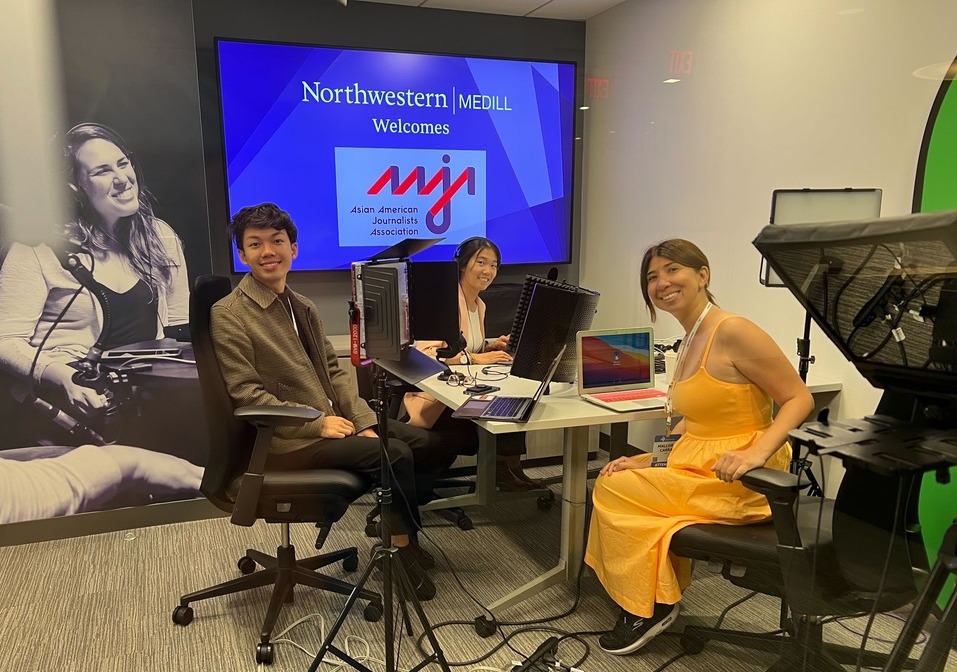
Claudia Cruz was a stunned grad student the first time she stepped foot in a National Association of Hispanic Journalists conference.
“There’s nothing like walking into a convention career fair where there are 250 media outlets, all ones you want to work for,” said Cruz, who is now a University of Nevada, Reno journalism professor and the president of the NAHJ Nevada chapter. “You work your way through the floor, picking up business cards and getting headshots done. It’s such an amazing opportunity to network.”
Attending summer journalism conventions is a formative experience for any journalist; there are associations for numerous beats, platforms and identities — from the Investigative Reporters and Editors to the Indigenous Journalists Association conferences. But these multi-day events can also be quite pricey. Registration fees can cost as much as $400, with travel and hotel expenses exceeding $1,000, depending on the location of the conference. However, if you know where to look, you can get around some of the costs.
With summer conference season underway, I spoke with veteran attendees about how to make the most of the conventions without breaking the bank.
Plan far in advance
At the start of each year, NBC BLK director Michelle Garcia begins planning her work travel, including which journalism conventions she’ll attend. This year, she wanted to go to the Online News Association’s convention for digital journalists and chatted with her manager about it. “I want to go outside of my comfort zone and learn some different things at ONA,” Garcia said.

Preparing for these conferences in advance is important, especially if journalists hope to be reimbursed by their employer. Some media outlets will pay a journalist’s annual membership fees or conference registration but may ask them to represent the company at the job fair (known as “tabling”).
“Find out if your employer or university is attending and see if you could volunteer with them,” Cruz said. “Sometimes, because they’re exhibitors, they get a certain number of free registrations, and they might use it to pay for you.”
For early- and midcareer journalists, pitching workshops and panels to convention planning committees can lead to their ideas being produced and the registration being free or discounted.
Most group chapters also offer stipends of varying dollar amounts to help pay for convention registration, travel and hotel costs. However, those deadlines, as well as registration rates, are staggered throughout the year; try to lock in early bird pricing as soon as possible. Competitive programs that fully pay for students’ convention attendance, like the NAHJ and the National Association of Black Journalists student projects, along with the Asian American Journalists Association’s VOICES fellowship, have deadlines in the winter and early spring.
“I recommend students, especially if they are already members and are getting emails, to make sure they read the newsletters,” Cruz said. “That’s where they will see and find the deadlines for the student projects.”
Take advantage of grants and funding opportunities
While the journalism organizations themselves have many opportunities to help fund your convention trip, they’re very competitive. Reporters at all stages of their careers may have to look at outside opportunities to make it happen.



For instance, the Field Foundation and Dow Jones News Fund fellowships offer support like complimentary registration and travel stipends to NAHJ 2025 attendees. The nonprofit Tiffany Shackelford Foundation also offers the Shines Fund, which gives out up to 10 stipends annually so reporters can attend events like conferences.
Knowing that there needs to be more convention funding opportunities, NABJ student representative and recent graduate Grant Hines spearheaded the creation of the organization’s student and young journalist convention grant in 2024. It paid for eight students’ registrations, hotels and flights to the NABJ convention in Chicago last year, and it will fund five students’ trips to the convention this year in Cleveland.
“When young people and students are looking to get involved with NABJ, they mainly think about the convention, so when they want to come to the convention, one of the barriers is affordability,” Hines said. “Having a way to pay for all of their expenses to come to the convention is such a relief for a lot of people to get introduced to NABJ, or expand their presence in NABJ.”
Get creative with travel and accommodations
Even if you have to fund part — or all — of your convention trip yourself, you can still get creative with cutting costs. Journalist Katherine Fan, who has covered credit cards and miles travel programs for The Points Guy, NerdWallet and Business Insider, has attended over 20 conventions, including as a freelancer, creatively paying most of her own way.

She said freelancers should see conventions as a business expense and keep track of conference costs. “It doesn’t formally have to be a business savings account or a business checking account or a business credit card,” she said. “Just make sure that all of your accounts and all of your finances are separate when you are working on work-related expenses like a convention.”
This is also where loyalty programs, like credit card points and airline miles, can come in handy. Fan recommends joining as many of those programs as possible and letting the miles add up for occasions like conferences.
“It doesn’t cost you anything to set up an account with every single airline and hotel team that you stay with,” she said. “Eventually, you will have enough miles for a free flight somewhere. You may not be able to get all of your earning potential together in time for this year’s conference, but you can plan well ahead for next year.”
When it comes to staying at the convention hotel, Fan recommends having a roommate. “I was able to split my costs with someone else,” she said, “but I also met really awesome humans that I wouldn’t have interacted with as closely, both before and during the conference.”
Embrace on-site convention resources
Once you make it to the journalism convention itself, there are tons of resources on site — and not just the job fair. For example, NBCU Academy offers all-day workshops at NAHJ, AAJA and NABJ, with resume review sessions, script critiques and free glam and professional headshots.

Garcia has attended many workshops at the NABJ and National Association of LGBTQ+ Journalists conferences as a company representative and advises journalists to treat every interaction with intention, like a job interview. “Be present for the presentation,” Garcia said. “Ask questions. Make it clear that you are engaged and interested. Show that you actually care about being there in the moment and this is not just a transactional meeting for you,” she said.
Also, make sure to check the conference schedule for mixers and events with free food, which can save some money. Stay flexible with your plans; it’s not uncommon to collect a new group of friends each night of the convention, head to dinner and split the expense across the group.
These conferences also require professional attire, along with formal clothing for the gala that closes out the convention — and that can get pretty expensive. In 2022, Spokane KREM anchor Tim Pham got a huge response online when he offered free ties from his extensive collection to young reporters.
Inspired by his actions, AAJA attendees Corinne Chin and Jin Ding started a professional clothing swap in 2022, for anyone at the convention to donate and wear. The event has become something many attendees look forward to every year.
“I wanted our students and first-time attendees who show up to feel welcome here,” said Ding. “Our clothing swap doesn’t have a gender binary, and we are able to create a space where everyone feels welcome.”



